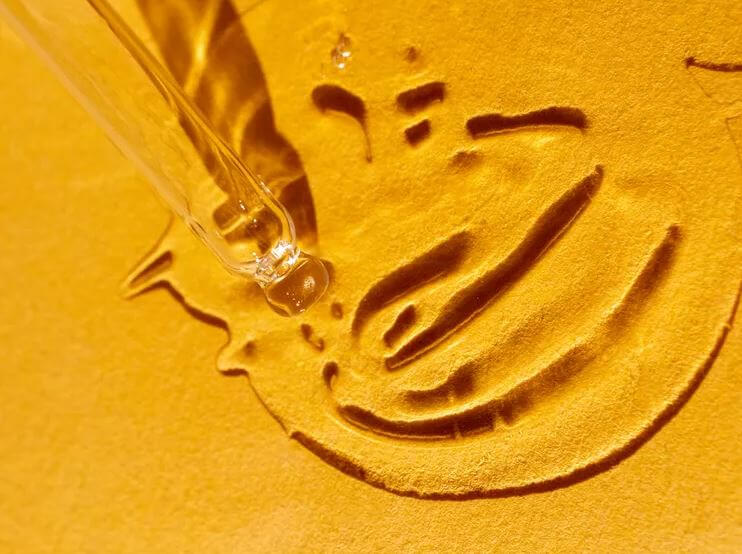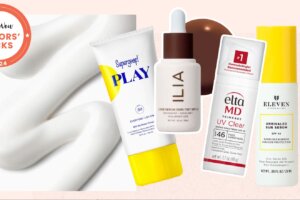Read Full Article HereCan You Put Essentials Oils on a Sunburn? We Asked Dermatologists
by BROOKE SHUNATONA
If you’ve ever suffered a sunburn, you know you’ll try anything to lessen the sting, the burn, and the redness. And while aloe vera is one of the most tried-and-true methods, others swear by essential oils. But before you grab your eucalyptus tinctures, there are a few important things you should know about applying oils to your raw, tender, sunburned skin.
Ahead, all the expert advice you need from board-certified dermatologists Jeanine Downie, MD, of Image Dermatology; Nava Greenfield, MD, of Schweiger Dermatology Group; Suneel Chilukuri, MD, of Refresh Dermatology; Dr. Jacqueline Watchmaker, a board-certified dermatologist with U.S. Dermatology Partners Phoenix; and cosmetic chemist David Petrillo, founder of Perfect Image.
Can You Use Essential Oils on a Sunburn?
Because of the many ingredients and nutrients found in a variety of essential oils, you might think you can use them on a sunburn, but it isn’t advised. “It’s not recommended—most essential oils contain fragrance and other properties that could irritate a burn or exacerbate other skin conditions, such as eczema, psoriasis, or contact dermatitis,” Petrillo says. Instead, sunburn should be treated with tried-and-true ingredients like aloe vera.
Dr. Watchmaker echoes those concerns, saying, “In general, I do not recommend applying essential oils to the skin. While there are anecdotal reports of their benefits, there are not many safety studies or large-scale scientific studies confirming their benefit. In addition, essential oils routinely cause contact dermatitis, and this risk may be elevated when applying essential oils to sunburned or damaged skin.”
Potential Side Effects of Using Essential Oils on Sunburn
While the benefits of essential oils might be unclear, the side effects are much more well-known. “If you use a scented oil, you have to hope the person can tolerate the scent,” Downie explains. “If they can’t, you’re going to make your sunburn worse by giving them a sunburn and then a contact dermatitis, which is almost like you’re giving them a sunburn and then a chemical burn.”
Dr. Watchmaker notes that some oils — even those that some might say are beneficial for sunburned skin — could make the problem worse. “You might read online that peppermint, eucalyptus, and lavender essential oils can help calm inflamed skin but, in some patients, essential oils might actually worsen their inflamed skin,” she says. Instead, she says to moisturize the skin “at least twice daily, use an over-the-counter hydrocortisone (applied prior to moisturizer), ice packs and if needed, seek the care of a board-certified dermatologist.”
Both Downie and Greenfield recommend waiting until the healing stage of the burn if you’re going to use essential oils. And before you do, all of the experts suggest first testing the ingredient for skin tolerability by applying a little bit behind your ear or on the back of your hand and taking note of how your skin reacts. “You want to make sure that they’re not going to sensitize the skin,” Chilukuri says.
What to Use Instead
In lieu of an oil, aloe vera is really the most-supported treatment for a fresh sunburn. But once your sunburn has cooled to the touch, you have more options. Downie recommends Theraplex Clear Emollient Lotion ($12), which is hypoallergenic, fragrance-free, and good for all skin types. Dr. Watchmaker, meanwhile, recommends “over-the-counter hydrocortisone 1%, a safe and effective alternative.” In addition, she says keeping sunburned skin “nice and moisturized with a thick, bland moisturizer (like Cetaphil, CeraVe, or Vanicream)” can help soothe sunburned skin.
When Can You Start Using Essential Oils on Sunburned Skin?
If you are going to try an essential oil, be sure to do it only on skin that has healed. In other words, if your sunburn is so severe it’s caused a blister or broken skin, step away from the oils, says Chilukuri: “When you have a break in the skin, I’m worried that any of these essential oils can be a little bit more irritating and cause more of an allergic reaction.”
According to Greenfield, anyone with sensitive skin should avoid using essential oils as well as those who have more than a first-degree burn from the sun. “Don’t apply it to skin that has an abrasion or open sores or blisters,” Greenfield advises. “Don’t apply it to skin that is very red and painful. It can cause an irritant reaction on these conditions and cause more harm than good.”
Best Essential Oils After a Sunburn
According to Petrillo, peppermint is viable for someone who has a moderate to severe sunburn and is looking to feel relief from the burning sensation. “Menthol, its most potent ingredient, creates a pain-relieving effect on sunburns by stimulating cold receptors on your skin and narrowing inflamed blood vessels, dilating when exposed to the sun,” Petrillo explains. “However, one thing to note with peppermint oil is that it’s shown to cause minor skin irritation and redness.”
Petrillo says eucalyptus has similar properties to peppermint oil and could potentially help relieve some of the pain, irritation, and other discomforts of sunburns. Petrillo adds that when applied directly to the skin, chamomile can alleviate pain and discomfort as well as soothe the skin.
Chilukuri says tea tree oil might also help because not only is it anti-inflammatory, but it’s also antibacterial, anti-fungal, and anti-viral. Because everyone carries some staph on their skin, Chilukuri explains that when you have a break in the skin, the staph can go in that break and lead to an infection. For that reason, Chilukuri says something that’s microbial or anti-inflammatory could be beneficial for a sunburn.
The Takeaway
According to Petrillo, most experts will also often err on the side of caution and recommend bland moisturizers and cooling gels to alleviate sunburns over essential oils. Petrillo also recommends non-fragrant oils, like coconut oil, cocoa butter, jojoba oil, and sunflower seed oil, which are frequently thought to be safe and non-irritating. These plant-based oil alternatives can also be used as carrier oils for the essential oils if you do choose to use them.
If you want to try an essential oil, Greenfield says to reach for non-fragranced products that are gentle and to add avocado oil (a non-fragrant oil), aloe vera (to soothe the skin), and a thick petroleum base (to help the damaged skin heal its barrier) to the list of alternative sunburn treatments. Chilukuri recommends applying a steroid cream underneath the petroleum base for the first two to four days after a sunburn.
Can You Put Essentials Oils on a Sunburn? We Asked Dermatologists
May 31, 2023








